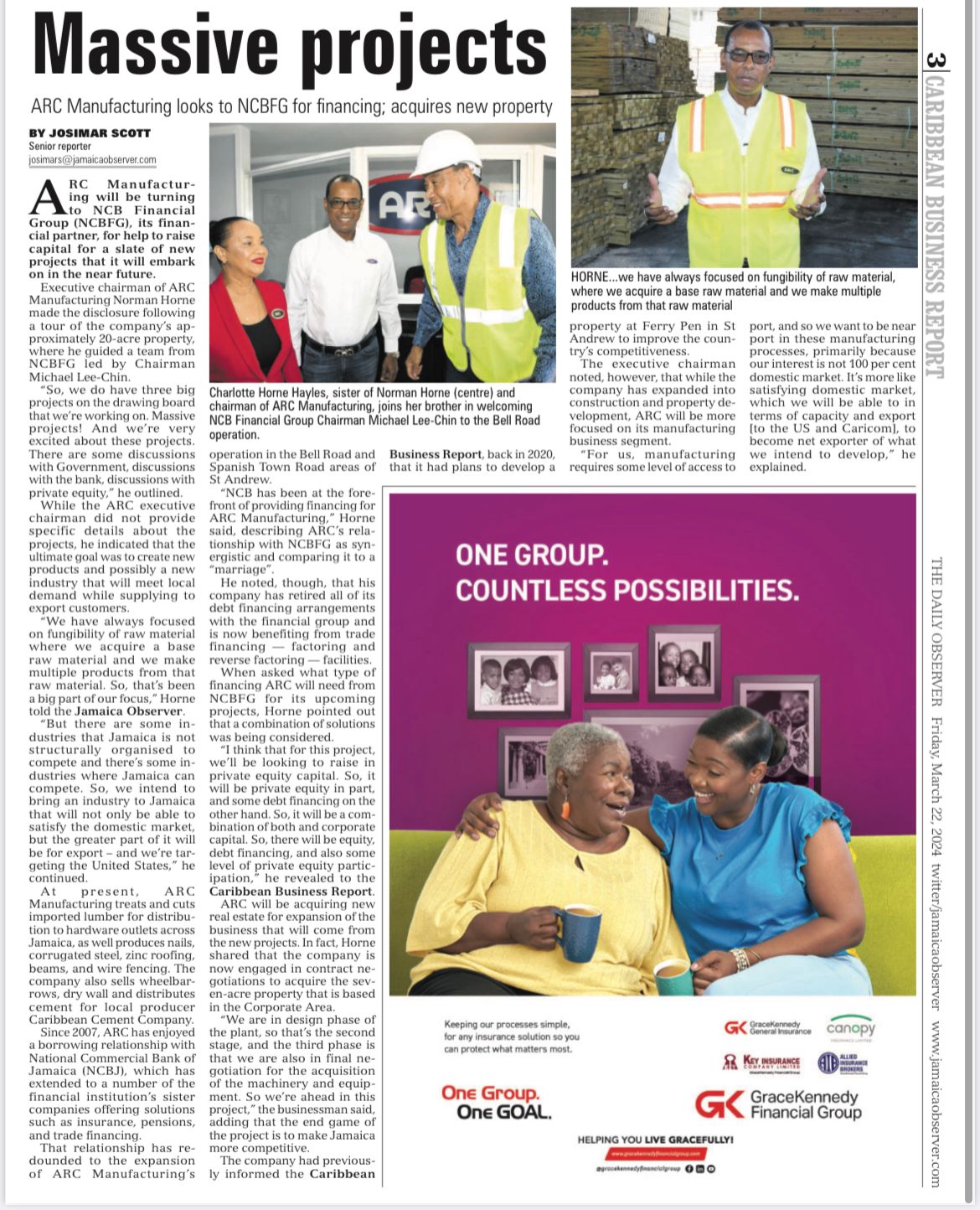
ARC Manufacturing will be turning to NCB Financial Group (NCBFG), its financial partner, for help to raise capital for a slate of new projects that it will embark on in the near future.
Executive chairman of ARC Manufacturing Norman Horne made the disclosure following a tour of the company’s approximately 20-acre property, where he guided a team from NCBFG led by Chairman Michael Lee-Chin.
“So, we do have three big projects on the drawing board that we’re working on. Massive projects! And we’re very excited about these projects. There are some discussions with Government, discussions with the bank, discussions with private equity,” he outlined.
While the ARC executive chairman did not provide specific details about the projects, he indicated that the ultimate goal was to create new products and possibly a new industry that will meet local demand while supplying to export customers.
“We have always focused on fungibility of raw material where we acquire a base raw material and we make multiple products from that raw material. So, that’s been a big part of our focus,” Horne told the Jamaica Observer.
“But there are some industries that Jamaica is not structurally organised to compete and there’s some industries where Jamaica can compete. So, we intend to bring an industry to Jamaica that will not only be able to satisfy the domestic market, but the greater part of it will be for export – and we’re targeting the United States,” he continued.
At present, ARC Manufacturing treats and cuts imported lumber for distribution to hardware outlets across Jamaica, as well produces nails, corrugated steel, zinc roofing, beams, and wire fencing. The company also sells wheelbarrows, dry wall and distributes cement for local producer Caribbean Cement Company.
Since 2007, ARC has enjoyed a borrowing relationship with National Commercial Bank of Jamaica (NCBJ), which has extended to a number of the financial institution’s sister companies offering solutions such as insurance, pensions, and trade financing.
That relationship has redounded to the expansion of ARC Manufacturing’s operation in the Bell Road and Spanish Town Road areas of St Andrew.
“NCB has been at the forefront of providing financing for ARC Manufacturing,” Horne said, describing ARC’s relationship with NCBFG as synergistic and comparing it to a “marriage”.
He noted, though, that his company has retired all of its debt financing arrangements with the financial group and is now benefiting from trade financing — factoring and reverse factoring — facilities.
When asked what type of financing ARC will need from NCBFG for its upcoming projects, Horne pointed out that a combination of solutions was being considered.
“I think that for this project, we’ll be looking to raise in private equity capital. So, it will be private equity in part, and some debt financing on the other hand. So, it will be a combination of both and corporate capital. So, there will be equity, debt financing, and also some level of private equity participation,” he revealed to the Caribbean Business Report.
ARC will be acquiring new real estate for expansion of the business that will come from the new projects. In fact, Horne shared that the company is now engaged in contract negotiations to acquire the seven-acre property that is based in the Corporate Area.
“We are in design phase of the plant, so that’s the second stage, and the third phase is that we are also in final negotiation for the acquisition of the machinery and equipment. So we’re ahead in this project,” the businessman said, adding that the end game of the project is to make Jamaica more competitive.
The company had previously informed the Caribbean Business Report, back in 2020, that it had plans to develop a property at Ferry Pen in St Andrew to improve the country’s competitiveness.
The executive chairman noted, however, that while the company has expanded into construction and property development, ARC will be more focused on its manufacturing business segment.
“For us, manufacturing requires some level of access to port, and so we want to be near port in these manufacturing processes, primarily because our interest is not 100 per cent domestic market. It’s more like satisfying domestic market, which we will be able to in terms of capacity and export [to the US and Caricom], to become net exporter of what we intend to develop,” he explained.
Published by The Jamaica Observer.
